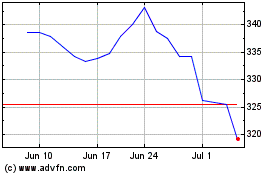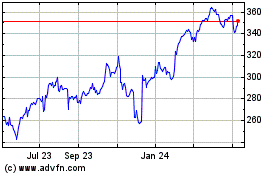New York Life to Pay $6.3 Billion for Cigna's Life and Disability Insurance Business -- Update
December 18 2019 - 11:57AM
Dow Jones News
By Leslie Scism
New York Life Insurance Co. agreed to pay $6.3 billion in cash
for a Cigna Corp. unit that sells nonmedical insurance products to
employers, the two firms said Wednesday.
The deal will catapult the New York insurer up the market-share
rankings of businesses providing benefits like life insurance,
disability-income insurance and accident insurance to employees of
U.S. companies.
The sale is expected to help health giant Cigna focus on its
core business.
New York Life is one of the nation's oldest and financially
strongest life insurers. It is owned by its policyholders, making
it one of the last of a once-large number of so-called mutuals, and
doesn't trade publicly. Based in New York, the 174-year-old company
is well known for its fleet of career agents who sell traditional
life insurance to households across the U.S.
Like other U.S. life insurers, New York Life is looking for ways
to expand in a competitive marketplace as low interest rates make
life insurance and retirement-income annuities -- its core products
-- less attractive to some consumers.
New York Life Chief Executive Ted Mathas said in an interview
that the deal "is a great way to deploy excess capital" that
otherwise would go into high-quality but relatively low-yielding
bonds.
U.S. insurers have been eager to enlarge their group-benefits
businesses. In contrast to many products sold by life insurers to
consumers, group policies can be repriced when they are up for
renewal, generally every one to five years. That provides an
opportunity for insurers to react to the market and to changing
circumstances and protect themselves from inflation.
Group products also generally need less capital to back them up,
compared with life insurance and annuities sold to consumers that
carry lifetime income or other decadeslong guarantees.
Cigna said it expects to use proceeds for share repurchases and
repayment of debt in 2020. Cigna's board of directors increased the
company's share repurchase authority by $3 billion to an aggregate
amount of $4 billion.
Wall Street analysts said the deal makes sense for Cigna.
Scott Fidel, a managing director at Stephens Inc., said the
Cigna unit's revenue growth rate detracts from the company's
profile, and its divestiture reduces Cigna's interest-rate
exposure. JPMorgan said that the unit isn't seen as core by
investors.
The acquisition is expected to close in the third quarter.
The Wall Street Journal first reported the negotiations last
week.
New York Life has a group-life-insurance business that is
smaller than that of Cigna. The insurer said the acquisition would
operate as a self-standing unit, with Cigna employees transferring
to New York Life, because there is minimal overlap in its client
base with New York Life's existing group business.
The Cigna unit primarily sells to midsize and large employers,
while New York Life focuses on associations and membership
groups.
The additional premium from the Cigna purchase will propel New
York Life into the top five of insurers by market share selling
nonmedical insurance for employers' benefit programs.
New York Life is one of the best capitalized of any U.S. life
insurer, with "surplus" -- the insurance-industry equivalent of net
worth -- of $25 billion at the end of 2018. The company had
operating earnings in 2018 of $2.31 billion, a 12.5% increase over
2017, according to data from ratings firm A.M. Best Co. Its net
premiums written totaled $29.3 billion in 2018.
The agreement for the Cigna unit follows other moves by Mr.
Mathas to diversify operations, including acquisitions to broaden
the reach of its investment-management arm.
New York Life said the acquisition would reinforce its overall
financial strength by generating capital that can contribute to its
surplus, dividends, and earnings, which directly benefits the
company's policy owners.
Cigna has been digesting its $54 billion acquisition of
pharmacy-benefit manager Express Scripts Holding Co., which closed
about a year ago. It could use proceeds from any new deal to reduce
its debt, which stands at about $39 billion, while refining its
focus on its health-services business. Cigna's market
capitalization is about $71 billion.
--Anna Wilde Mathews contributed to this article.
Write to Leslie Scism at leslie.scism@wsj.com
(END) Dow Jones Newswires
December 18, 2019 11:42 ET (16:42 GMT)
Copyright (c) 2019 Dow Jones & Company, Inc.
Cigna (NYSE:CI)
Historical Stock Chart
From Mar 2024 to Apr 2024

Cigna (NYSE:CI)
Historical Stock Chart
From Apr 2023 to Apr 2024
